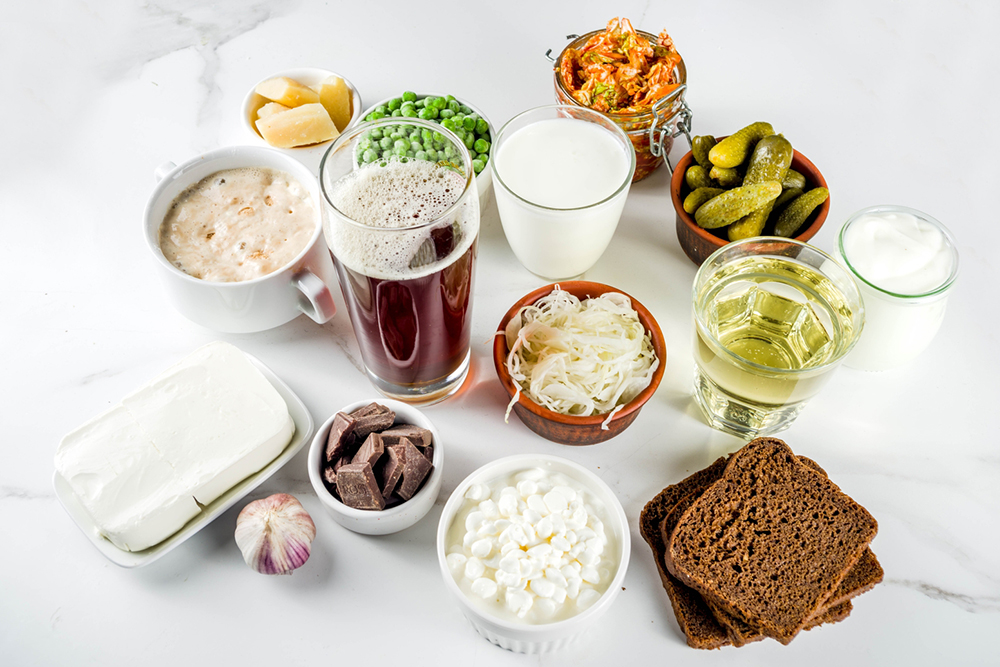10 Probiotic Foods to Help Reduce Gas and Bloating
Dealing with bloating and gas can be uncomfortable and painful. Thankfully, several foods, especially probiotics, can offer relief from gas and improve gut health. Probiotics are live, beneficial bacteria and yeasts found in some foods that help restore the gut microbiome to relieve gastrointestinal issues and boost immunity. They work by competing with harmful bacteria in the gut for nutrients, eventually replacing them and reducing bloating, inflammation, and smelly gas.
1. Yogurt
One of the most popular sources of probiotics, yogurt contains live cultures like Lactobacillus and Bifidobacterium. Some experts say it can help reduce lactose intolerance and control gas, diarrhea, and other digestive issues.

One should always opt for yogurt with live and active bacterial cultures. Plain, natural yogurt that is unsweetened or Greek yogurt can be a wonderful addition to one’s meals and smoothies. Plus, they are great sources of protein. That said, one should know that frozen yogurt typically does not contain any probiotics.
2. Sauerkraut
A fermented cabbage dish, sauerkraut is rich in probiotics like Lactobacillus. Adding these probiotics to one’s meal plan can help reduce issues like smelly gas, bloating, and inflammation. One can mix it into salads or have it alongside a sandwich to add some crunch, flavor, and a source of probiotic-rich fiber to the meal.
It is recommended to look for the unpasteurized variety when buying sauerkraut, as the pasteurization process followed by supermarkets can kill the good bacteria.
3. Miso
This fermented soybean paste is loaded with vitamins, minerals, and probiotics. It can help strengthen the immune system, improve digestion, and reduce the risk of gastrointestinal reflux (GERD). Miso can easily be added to soups, noodle-based dishes, marinades, sauces, and salad dressings. That being said, it is best to avoid boiling dishes that contain miso, as the harsh cooking process can kill the good bacteria.
4. Kefir
Kefir is a fermented milk drink that is akin to runny yogurt. It has its own strains of probiotic bacteria that can help fight digestive issues, such as gas and bloating. Some studies suggest that regularly consuming kefir can also help improve blood sugar control, reduce insulin resistance, and boost muscle health.
Just like yogurt, kefir can easily be mixed into marinades, smoothies, and dips as a natural probiotic supplement.
5. Tempeh
A fermented food made from soybeans, tempeh is naturally high in fiber. Fungi like Rhizopus oligosporus or Rhizopus oryzae are used in fermentation, adding to its probiotic content. Its texture and protein content have gained popularity as a meat replacement. Tempeh can be easily added to stews, marinades, barbecues, and pot pies as a vegan source of protein.
6. Kimchi
Most traditional meals serve kimchi, a spicy, fermented side dish. Lactic acid bacteria (LAB), produced as part of the fermentation process, give kimchi its probiotic properties and help boost gastrointestinal health.
Kimchi is also rich in vitamins and minerals like vitamins A, B6, C, and K, along with folate, beta-carotene, choline, iron, potassium, and calcium, thanks to the other ingredients used to make this dish. This makes it a powerful anti-inflammatory that can help stabilize blood sugar, fight stomach ulcers, improve cognitive impairments, and strengthen the immune system.
7. Kombucha
This is a fermented and slightly effervescent tea drink typically made from sweetened black or green tea. Over the last decade, kombucha has become quite popular, given its probiotic health benefits. Studies suggest the beverage can help improve the digestive process and reduce issues such as gas and bloating.
Acetic acid, the primary compound in vinegar, is released during fermentation, giving kombucha its pungent taste. This acid can also help kill harmful microorganisms in the body, reducing the risk of bacterial infections.
8. Naturally fermented pickles
Pickles fermented in brine instead of vinegar contain probiotic properties, which can help control issues such as smelly gas and bloating. They also contain antioxidants like flavonoids and phenols, which can help fight inflammation in the body, reduce oxidative stress, and boost gastrointestinal health.
9. Cheese
Cheeses that have been aged but not heated can also be a stellar source of probiotics. This includes Swiss, Gruyere, Provolone, Gouda, cheddar, Edam, and cottage cheese varieties.
One should note that cheese can be high in saturated fat and sodium, so limiting the quantity of cheese consumed is important based on one’s nutritional requirements.
10. Acidophilus milk
Acidophilus milk is a beverage fermented by the bacteria Lactobacillus acidophilus. Not only is it a wonderful source of probiotics, but studies also suggest it can help prevent or control intestinal infections, improve lactose digestion, control cholesterol, and act as an anticarcinogen. It can be made at home or purchased from the store. For optimal results, it is recommended to consume this beverage as is. It can also be used as a replacement for milk in recipes or to make creamy dressings like Caesar and ranch.
Some natural whole foods, such as ginger, fennel, bananas, lemons, avocados, cucumbers, asparagus, kiwi, papaya, white beans, pineapple, beets, tomatoes, artichokes, lentils, and blueberries, are rich sources of prebiotics. These are a type of essential fiber that feeds the good bacteria in the gut, further improving digestive health and reducing gas and bloating.

